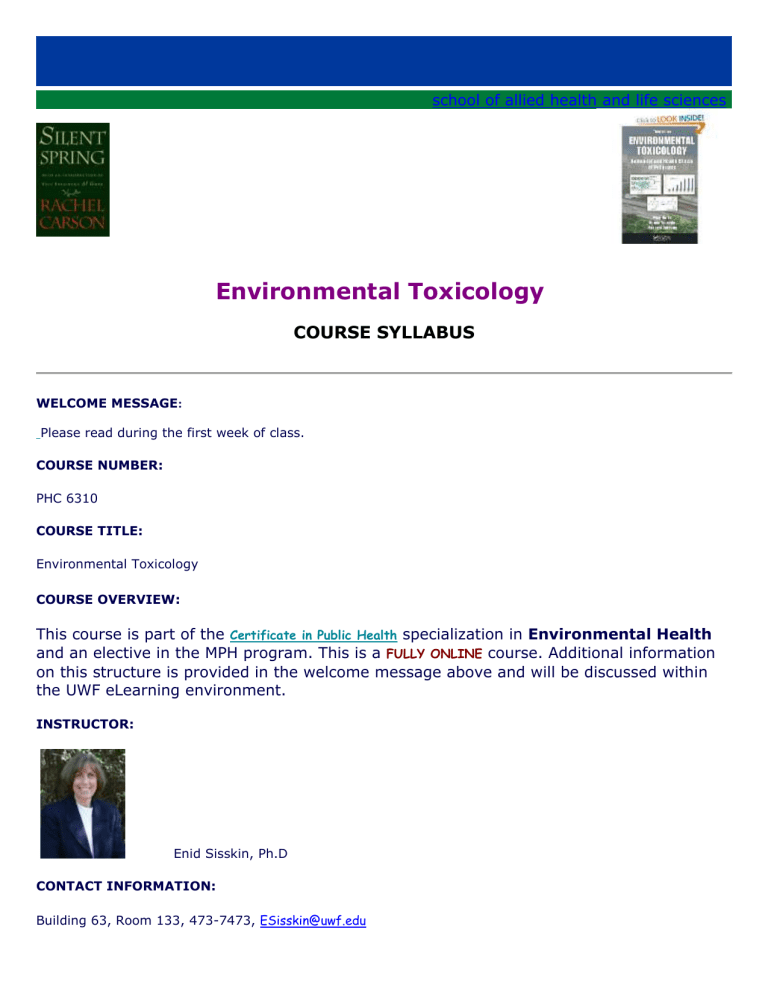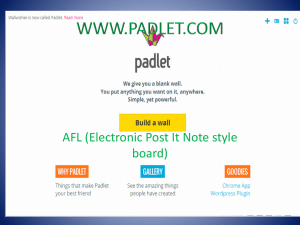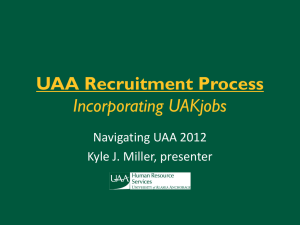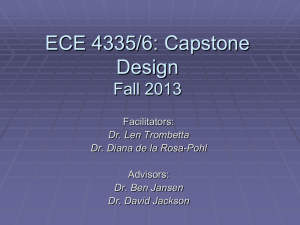course syllabus - University of West Florida

school of allied health and life sciences
Environmental Toxicology
COURSE SYLLABUS
WELCOME MESSAGE
:
Please read during the first week of class.
COURSE NUMBER:
PHC 6310
COURSE TITLE:
Environmental Toxicology
COURSE OVERVIEW:
This course is part of the
Certificate in Public Health
specialization in Environmental Health and an elective in the MPH program. This is a
FULLY ONLINE
course. Additional information on this structure is provided in the welcome message above and will be discussed within the UWF eLearning environment.
INSTRUCTOR:
Enid Sisskin, Ph.D
CONTACT INFORMATION:
Building 63, Room 133, 473-7473, ESisskin@uwf.edu
PREREQUISITES OR COREQUISITES:
Although there are no prerequisites for this course, a basic understanding of biological processes will assist greatly in successfully completing this course. Any information required over and above that will be supplied.
COURSE DESCRIPTION:
Environmental toxicology is the study of the effects of toxic substances on health and the environment. The student will recognize that human survival depends upon the well-being of other species and upon the availability of clean air, water, and food. Anthropogenic, as well as naturally occurring chemicals, can have detrimental effects on living organisms and ecological processes. Concepts to be covered include occurrence of toxicants, damage process and action of toxicants, factors affecting xenobiotic action, defense responses to toxicants, and others. The course will also examine chemicals of environmental interest and how they are tested and regulated. Case studies and special topics will be examined. Each week, you'll need to read one or two chapters in the course text and any supplemental material and answer questions based on the material read for a completion grade. Next, you'll listen to or watch about an hour's worth of audio and/or video clips and participate in a threaded discussion on one of the topics covered there. In addition, most weeks there will be an activity, generally something like a scavenger hunt, trivia quiz, writing activity etc. generally based on Internet searches related to course material.
STUDENT LEARNING OUTCOMES (Objectives) Following this course, the student will be able to:
Explain of how toxicants get into the environment and which diseases may be associated with them.
Describe how these chemicals are tested and regulated.
Identify the damage process and action of toxicants.
Give examples of what the factors are that affect xenobiotic action.
Describe how environmental chemicals are metabolized.
Predict the defense response to toxicants.
Identify a variety of chemicals by class (particulates, VOCs, heavy metals) and determine sources of exposure and effects on human, plants, and animals.
Identify potentially toxic local sites and predict environmental outcomes.
TOPICS COVERED: o Module 1 - Introduction, Environmental Change and Health o Module 2 - Occurrence of Toxicants, Toxic Action of Pollutants o Module 3 - Factors Affecting Xenobiotic Action o Module 4 - Biotransformation - Metabolism of Xenobiotics, Defense Responses to Toxicants o Module 5 - Air Pollution - Inorganic Gases and Particulate Matter o Module 6 - Environmental Fluoride and VOCs o Module 7 - Midterm Modules 1 - 6 o Module 8 - Soil and Water Pollution - Environmental Metals and Metalloids o Module 9 - Pesticides and Related Materials o Module 10 - Endocrine Disruption o Module 11 - Mutagenic Pollutants, Environmental Cancer
o Module 12 - Ecological Risk Assessment o Module 13 - Final Exam Modules 8 - 12
REQUIRED TEXTS: o Environmental Toxicology: Biological and Health Effects of Pollutants, Third Edition by Yu, Tsunoda, and Tsunoda. [
ISBN 978-1-4398-4038-2
] o Silent Spring by Rachel Carson [ISBN: 0-39-568329-7]
SPECIAL TECHNOLOGY UTILIZED BY STUDENTS: (beyond baseline requirements of e-mail and word processing)
Students will utilize the Internet for searches and access websites. The student needs to have consistent internet and "Microsoft Word" reading capabilities. We strongly recommend you use Firefox as your browser. If you don't, at some point you will have problems.
GRADING/EVALUATION:
Evaluation of student grades will be based on their performance in the following areas: o Completion of chapter quizzes demonstrating their knowledge of the reading material (12 quizzes @ 5 points each for 60 points) o Participation in threaded discussions (4 discussions @ 10 points each for 40 points) o Completion of a variety of online activities (10 activities @ 20 points each for 200 points) o Midterm (100 points) o Final exam (100 points)
Grading:
Grading for this course will be based on a points system where the graded items will be worth 500 points (see above). The final grade will be based on the percentage of points earned : o A = 95 - 100% o A- = 90 – 94.9% o B+ = 87 – 89.9% o B = 84 – 86.9% o B- = 80 – 83.9% o C+ = 77 - 79.9% o C = 74 - 76.9% o C- = 70 - 73.9% o D+ = 67 - 69.9% o D = 60 - 66.9% o F < 60%
SPECIFICS ON GRADING:
Chapter Quizzes: The chapter quizzes are worth 5 points and you will get three tries to complete them.
Discussions: To get full credit (10 points), you will need an original posting (5 points) and respond to two of your classmates postings (2.5 points each). See below for how they will be graded.
Discussion Forum: Grading Rubric for original posting
5 pts EXCELLENT AND
COMPLETE
3 pts GOOD, BUT COULD BE
IMPROVED
1 pt
IMPROVEMENT
0 pts
FAIR, NEEDS MAJOR
POOR, OF NO
SIGNIFICANT VALUE
For five points, a posting will thoughtfully consider and respond to the question using sound argumentation and clear prose. Stellar posting that it is; it will contain virtually no grammatical errors or typos. Not only will such a post engage with the ongoing conversation in a rhetorically suitable fashion, it will foster further discussion on the topic, perhaps exploring new lines of argument or different perspectives. The five-pointer isn't just a response; it's proof that you are facilitating learning both for yourself and your fellow students. As you might imagine, this corresponds to an A
(100 percent).
The three-point posting is a competent response to the subject: it's
50 or so words long, more or less, it addresses the question, without going into much detail, and it contributes to the overall conversation as another voice on the subject. A three-point posting amounts to a B/B- (83 percent).
This posting reflects a less-than-adequate engagement with the subject, or is noticeably under the required word count. It does little to advance the discussion underway, and may even detract from it.
The one-point posting amounts to a C- (70 percent).
No posting, late posting(with no excuse, or a post that is but the briefest nod toward a response. (zero percent)
Discussion Forum: Grading Rubric for responses
2.5 pts
COMPLETE
2 pts GOOD, BUT COULD BE
IMPROVED
1 pt
0 pts
EXCELLENT AND
FAIR, NEEDS MAJOR
IMPROVEMENT
POOR, OF NO
For 2.5 points, a posting will thoughtfully consider and respond a classmate's message using sound argumentation and clear prose.
Stellar posting that it is; it will contain virtually no grammatical errors or typos. It will foster further discussion on the topic, perhaps exploring new lines of argument or different perspectives.
The 2.5-pointer isn't just a response; it's proof that you are facilitating learning both for yourself and your fellow students. As you might imagine, this corresponds to an A (100 percent).
The two-point posting is a competent response to a classmate’s posting: it addresses the posting, without going into much detail, and it contributes to the overall conversation as another voice on the subject. A two-point posting amounts to a B/B- (83 percent).
This posting reflects a less-than-adequate engagement with the subject, or is noticeably under the required word count. It does little to advance the discussion underway, and may even detract from it. This posting is characterized as “Yeah, right, I agree.” The one-point posting amounts to a C- (70 percent).
No posting, late posting, or a post that is but the briefest nod
SIGNIFICANT VALUE toward a response. (zero percent)
Activities: Each activity will have its own requirements which will be listed with the activity. Each activity will be worth 20 points.
Midterm and Final: Each exam will have its own requirements which will be listed with the exam. Each exam will be worth 100 points.
QUALITY ASSURANCE:
This course is reviewed during the semester and in an ongoing basis for quality by assessment personnel within the School of Allied Health and Life Sciences (SAHLS) to meet national standards established by the
Southern Association of Colleges and Schools, the Council on Education for Public Health, and/or to address quality enhancement initiatives of SAHLS. Student feedback is also vital to this process. When reviewing our programs, our accrediting partners expect to see 100% participation in the State-of-Florida mandated
SUSSAI (State University System Student Assessment of Instruction) evaluations. Thus, at the end of the semester, we need to hear from the folks that enjoyed the class and from the folks that have suggestions for improvement (ok, and from the folks that want to fill out the survey as quickly as possible with no comments to share!). BUT, we do need to hear from each and every student in this class, and we value your input.
When SUSSAI evaluations are ready for you to complete, you will see a News posting in the course. Please take a few minutes to complete this anonymous, brief web-based evaluation on this course, using these directions.
This course has gone through Quality Matters review and was found to meet all the qualifications. The information on QM is found on the homepage.
ONLINE TEST TAKING GUIDELINES:
Please do not begin any timed, online exam in the course that may overlap with the eLearning maintenance window. The eLearning maintenance window runs 3:00-6:00 am CST (Central Standard Time) each day. If you initiate an exam that overlaps with this time and experience any technical errors, your recorded score is likely to be close to 0 for such an attempt. There are no exceptions to this policy. If you experience any other technical problems or errors during any timed exam that does not overlap with the eLearning maintenance window, you are required to notify the Helpdesk immediately at helpdesk@uwf.edu
or (850)
474-2075. Failure to contact the HelpDesk to report the problem will result in a grade of 0 automatically being assigned. If you are unable to get immediate assistance from the HelpDesk during the exam, but have documented the problem in an email or voice mail, you may attempt to restart the exam using the same browser, or attempt to re-enter the exam with another browser. If you are still unable to restart the exam and continue with saving, please note that for your final submitted score to be recorded, you MUST still prove that you documented the original technical problem with the HelpDesk via helpdesk@uwf.edu
or (850) 474-
2075. Failure to do so will result in an automatic grade of 0 being assigned.
EXPECTATIONS FOR ACADEMIC CONDUCT/PLAGIARISM POLICY: o Academic Conduct Policy o Plagiarism Policy o Student Handbook
ASSISTANCE:
The Student Disability Resource Center (SDRC) at the University of West Florida supports an inclusive learning environment for all students. If there are aspects of the instruction or design of this course that hinder your full participation, such as time-limited exams, inaccessible web content, or the use of noncaptioned videos and podcasts, please notify the instructor or the SDRC as soon as possible. You may contact
the SDRC office by e-mail at sdrc@uwf.edu or by phone at (850) 474-2387. Appropriate academic accommodations will be determined based on the documented needs of the individual.
WHERE TO GET ASSISTANCE: As an online student, you do have access to the online services and tutorials of the UWF Writing Lab. Please review their services and tutorials now, located here . You can also call the
Grammar Hotline at: (850) 474-2129. I also suggest the online tutorials of the UWF Library, located here .
Copyright & Copy 2013, University of West Florida, 11000 University Parkway, Pensacola, FL 32514


